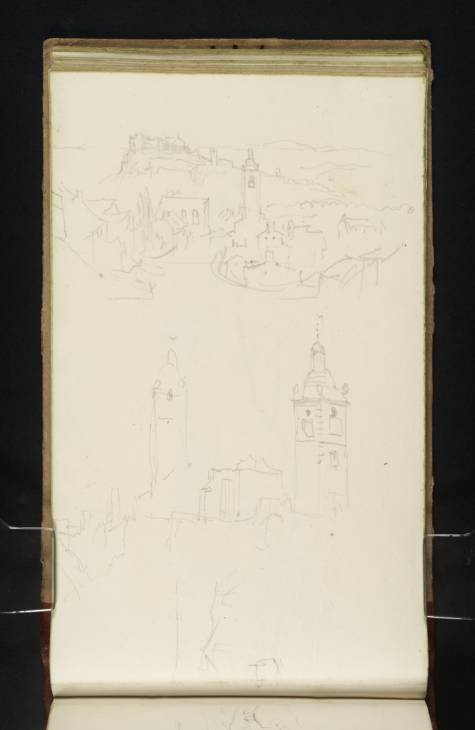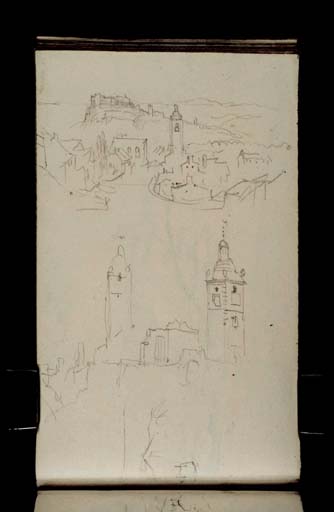Joseph Mallord William Turner Stirling from St Ninian's; and St Ninian's Church Tower 1834
Image 1 of 2
Joseph Mallord William Turner,
Stirling from St Ninian's; and St Ninian's Church Tower
1834
Joseph Mallord William Turner 1775–1851
Folio 45 Verso:
Stirling from St Ninian’s; and St Ninian’s Church Tower 1834
D26344
Turner Bequest CCLXIX 45a
Turner Bequest CCLXIX 45a
Pencil on off-white wove paper, 190 x 113 mm
Accepted by the nation as part of the Turner Bequest 1856
References
1909
A.J. Finberg, A Complete Inventory of the Drawings of the Turner Bequest, London 1909, vol.II, p.866, CCLXIX 45a, as ‘Stirling.’.
1936
Henry J. Crawford, Turner's Sketches and Drawings of Stirling and Neighbourhood With Some Notes on the Artist’s Scottish Tours also A Note on John Ruskin and Stirling, Stirling 1936, p.26.
1990
Dr David Wallace-Hadrill and Janet Carolan, ‘Turner’s Sketches North of Stirling’, Turner Studies: His Art and Epoch 1775 – 1851, Vol.10 No.1, Summer 1990, p.12.
1990
Dr David Wallace-Hadrill and Janet Carolan, ‘Turner North of Stirling in 1831; a checklist (2)’, Turner Studies: His Art and Epoch 1775–1851, Vol.10 No.2, Winter 1990, p.31 ill.51 in black and white.
With the sketchbook turned to the right are three studies of St Ninian’s Church tower and the distant Stirling Castle as seen from the village to the south. The two studies at the centre of the page depict the tower from slightly different angles, first with just an outline and a few additional details, and second with details of the brickwork, windows, pinnacles, the steeple and the clock faces (represented by blank squares). This more detailed sketch also includes ruins at the left which may be the chancel to the east of the tower, indicating that this view is from the north-west. In this case the archway beneath the tower must be what has now become a gate with pillars either side of it in the churchyard wall. Alternatively this could be a view from outside the arched gate at the east of the churchyard. In which case Turner must have ignored the chancel remains, but included the smaller ruins to the west of the tower. Most of the church was destroyed after it was used as a munitions store during the Jacobite Rising in 1745.1
At the top of the page is a sketch of the view north from the village of St Ninians to Stirling Castle with the church tower in the foreground. David Wallace-Hadrill has described this sketch as ‘showing the city at some distance in a strong morning light’.2 This observation is presumably based on the shadows that fall on the western side of the castle and Castle Rock. At the bottom of the page is the slight continuation of the sketch on folio 46 (D26345).
There are further views of Stirling from St Ninians on folios 46, 46 verso and 53 verso (D26345, D26346, D26360). There are also further views from nearby to the south, sometimes with St Ninian’s Church tower, on folios 46 verso–48 verso (D26346–D26350). Several of these depict the site of the Battle of Bannockburn (see folio 46 verso) which was perhaps Turner’s motivation for visiting the area. For a full list of Turner’s sketches of Stirling in this book, see folio 44 verso (D26342).
Thomas Ardill
October 2010
Frances H. Groom (ed.), Ordnance Gazetteer of Scotland: A Survey of Scottish Topography, Statistical, Biographical and Historical, Edinburgh 1882–5, reproduced ‘St Ninians (St Ringans)’, Gazeteer for Scotland, accessed 14 October 2010, http://www.scottish-places.info/towns/townhistory836.html .
How to cite
Thomas Ardill, ‘Stirling from St Ninian’s; and St Ninian’s Church Tower 1834 by Joseph Mallord William Turner’, catalogue entry, October 2010, in David Blayney Brown (ed.), J.M.W. Turner: Sketchbooks, Drawings and Watercolours, Tate Research Publication, December 2012, https://www


